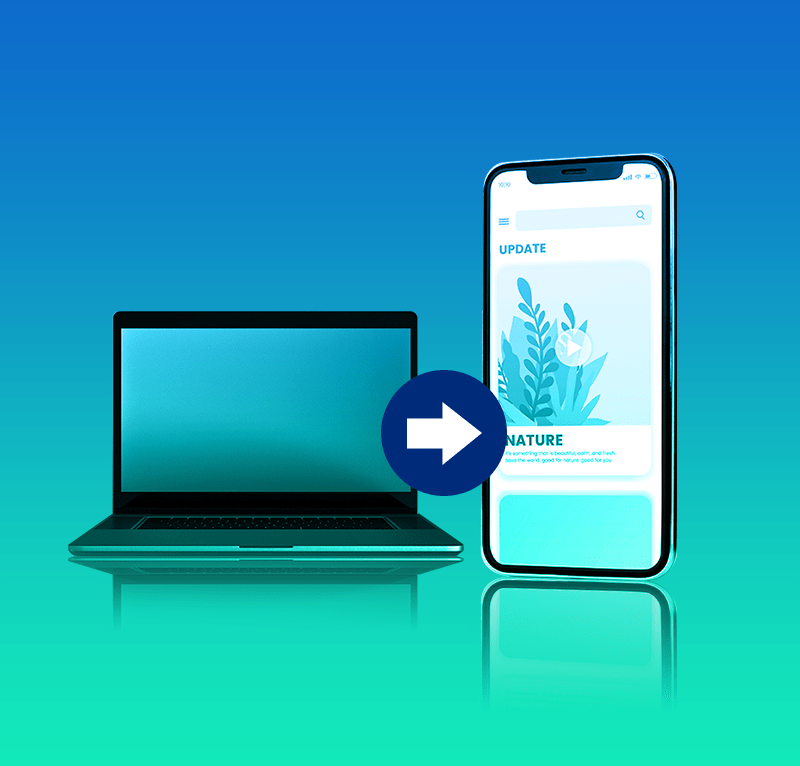
About us
Our Services
Our Expertise
Our Experience
Follow us
Why e2logy?
- We strive to provide superior customer service and ensure that every client is completely satisfied with our work.
- Our engineers are trustworthy, dedicated, and experienced and will go the extra mile to solve your IT issues.
- We are committed to delivering outstanding, cutting-edge IT solutions that add real value that goes beyond what is expected.

Why Should You Convert Your Web App to Mobile App?

Business websites offer a steady sales platform for customers, which is a valuable resource for businesses. It is generally accepted that a website is a cost-effective tool to communicate with a company’s clients.
What is your business output if you use a website or do you need to change your business strategy to improve it? Browsers such as Internet Explorer or Google Chrome can be used to access the websites. This website can be accessed via laptops, desktops, tablets, smartphones, and other devices with browser capability.
Technology is constantly evolving, and new trends are hitting the market from time to time, which has led to some drastic changes on the entire platform as of late. The end users’ use of data has been affected as a consequence. A few of these changes include:
- Mobile devices (such as smartphones) are now used more often than non-mobile devices (such as desktop computers).
- Hand-held devices improve the experience for both users and companies by offering more benefits than traditional devices.
These findings prompted the companies to change their strategies and make their existing websites more user-friendly and responsive after seeing these changes. Although the previous sites were modified, the rate of improvement in user engagement and interaction was still not satisfactory.
This is due to the absence of many useful functionalities included in mobile applications, such as GPS, Push Notifications, offline accessibility, camera support, and many more. As a result, businesses are now updating their websites to convert them to mobile apps to maximize their use of these features. In the above-mentioned statistics, we can also see that customers prefer mobile apps over websites.
Reasons to Convert Website into a Mobile App
1. Offline Accessibility
One of the main reasons for converting a business website into an app is to make their website available offline so their customers can access their websites without being connected to the internet. Mobile apps are also fundamentally different from websites because they can work offline. Since the apps allow users to access content both offline and online, they can consume information faster while enjoying a seamless user experience.
The apps for various industries, like retail, entertainment, finance, gaming, etc., are offering exceptional online as well as offline access to their end-users with just a few clicks on their smartphones.
2. Push Notifications
As we’ve talked about previously, push notifications to play an important role in driving retention and increasing app usage. These push notifications are now mandatory features in the development of mobile applications for this reason. As such, these push notifications work great for sending instant updates to your targeted audience, which helps you spread awareness of your brand more effectively.
In-app notifications appear when the user interacts with the app when the app is open, and the user receives them. Small and medium-sized businesses (SMEs) use non-intrusive notifications to promote their services and products through their apps.
3. Engagement & Interaction
The most common web design nowadays is websites that are easy to access with the ease of association between clients and tasks. The growth graph of websites dips as brands see the growth graph for their mobile apps dipping. Brands can now provide their consumers with a two-way experience through their mobile apps.
The one-click option will certainly improve the user engagement rate on the platform in addition to simplifying the sharing process from one person to another. There will also be a spike in customer interaction related to either the purchase of a product or the query of how the platform works.
4. Cost & Productivity
Comparatively to websites, mobile apps allow you to expand the reach of your target audience very quickly. Since extra mediators are removed from the process, app marketing costs are reduced for mobile apps. Almost a quarter of the productivity rate is increased with the cost reductions.
Communicating directly with the end-user reduces marketing costs to a greater degree the more you do it. It is a plus if the most widely used social media platforms like Instagram, Twitter, Facebook, etc., are integrated with your mobile app. Additionally, the number of unique visitors to your app will increase your social media footprint.
5. Branding Purpose
The conversion of your existing website into a mobile app is also beneficial for branding and design purposes. The mobile applications serve as a brand ambassador for your company, not the company website, which makes it difficult for users to interact. The fact that mobile apps don’t depend on a browser or internet connection allows them to work without the need for a browser.
In this case, our suggestion would be to redesign your brand while switching from a website to a mobile app. The reason for this is that you will be able to precisely tailor the application according to the needs and requirements of the users.
6. Faster Approach
As users want to access information faster than ever before, one of the main requirements is speed. Additionally, the fact that mobile apps are 1.5 times faster than websites is also pushing businesses to take their digitalization to the next level.
JavaScript is used in the vast majority of Android and iOS applications, resulting in three to five times faster function execution. Having these functions running on the back end allows the front-end segment of the app to provide an even more seamless user experience.
7. Personalization
Content that is personalized for each customer based on their preferences, likes, and dislikes is highly valued by them. Individuals tend to connect with a mobile app better if it is personalized. In addition to curating content from a user-centric perspective, push notifications were also curated using this approach.
Your targeted users can select and define exactly what they want beforehand by using the application. This is especially important when it comes to content selection. By analysing the engagement observations, you can make custom recommendations to your app so that users stay for a longer time.
Businesses are choosing to convert their websites into mobile applications for the following reasons. I would like to introduce the software aspect of the website to an app converter, which allows you to convert your website to an Android or iOS mobile app.
The conversion of your website into an iOS or Android app is an excellent way to start over. Furthermore, if you are looking to start a business, you can get your business developed into a mobile application directly instead of first creating a website then turning it into a mobile application.
Our experts suggest that instead of choosing one of these sites for app conversion, you should hire a well-reputed app development company for this purpose. Having professional help ensures that no boundaries are missed and that the final product matches what has been demanded.
Advantages of converting a Website into an App
Better Search Engine Optimization
As soon as Google released its first ‘app first’ ratings in 2016, we knew something was about to come. Google also began linking mobile applications to websites during this period. Keeping up with the rules set by Google is crucial for your business’s survival. In the past, brands have misunderstood Google trends and spent millions of dollars as a result.
Engagement rate higher
The engagement rate of users with applications is higher than that of websites. Applications such as push notifications act as a means of increasing user interaction with the application. The user is notified via a push notification when customized content is shared. Users are more likely to engage with a message if it is a preference they choose themselves.
A large community
Apps play a large role in gaining multiple users in a shorter amount of time as brands nowadays are constantly looking for ways to get loyal customers. These days, brands are highly concerned with building their communities, as you might have noticed already. The brand can share important insights with a base of loyal customers.
Using the device’s features
As opposed to websites, you can use your phone’s capabilities with your app. Many of those features include camcorder support that can be used to detect faces or scan documents, GPS for tracking your location or accessing maps, as well as many others. Apps are the only way to access all of the unique features of a device that cannot be accessed by websites.
Conclusion
You have now seen the top reasons for developing mobile apps based on your existing web application. As an extension of what you already have for the web, they work with it in synergy and do not replace what you have already built. Even though your web app is well-received, has a solid codebase, and is available to new users immediately – the mobile apps will enable your best fans to experience a rich and convenient experience.
The answer to your question is that businesses like Reddit, Quora, and Facebook always try to get you to download their apps. It’s not just for big brands, though; apps can work just as well for small businesses.
What is the best way to build them? Doesn’t it take months to build them and cost tens of thousands? It can – but that’s not always the case. Your web app is already built if that’s the case. With the right package, you can take the existing app and turn it into an iOS or Android app, which offers all the benefits above and provides a great app experience.
A fraction of the regular cost can also be paid for building your app in days.













